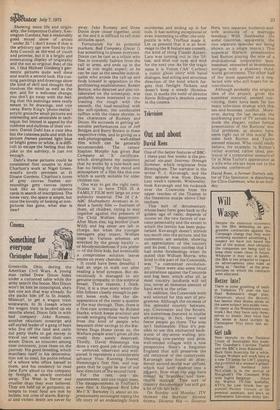Cinema,
Something for everyone
Christopher Hudson
• —
Greenville, Ohio, during the American Civil Wars. A young man called Drew Dixon hides under a curtained table while the army search the house. Mrs Dixon won't let him be conscripted, she's lost one son that way already. So she packs him off to St Joseph, Missouri, to get a wagon train westwards. In St Joseph where the wagon train is booked up six months ahead, Dixon falls in with bad company: Jake Rumsey, another reluctant conscript and self-styled leader of a gang of boys who live off the land and carry out petty thefts to get money to travel out west under their own steam. Dixon, an innocent among near-innocents, joins them on the journey. His good breeding, which manifests itself in his determination not to steal, his polite refusal of a whore who offers herself to them, and his tendency to read Jane Eyre aloud to the company by firelight, is slowly corroded away. The West is fiercer and crueller than they ever believed. They are held up at gunpoint; attempts to steal food are met by bullets, not cries of alarm. Betrayal and violent death are never far away. Jake Rumsey and Drew Dixon draw closer together, until at the end it is difficult to tell their attitudes apart.
Fortunately for its potential markets, Bad Company (Oscar 1) has something to please everyone. Dixon can be cast as a villain who flies in cowardly fashion from the call to arms, and ends up in the bad as you might expect: or he can be cast as the sensible individualist who avoids the call-up and finds himself in opposition to the profiteering establishment. Robert Benton, who directed and also collaborated on the screenplay, was probably more interested in contrasting the rough with the smooth, the loud-mouthed with the soft-spoken, the uneducated ruffian with the classy shyster, in the characters of Rumsey and Dixon, He succeeds in getting admirable performances out of Jeff Bridges and Barry Brown in these respective roles, and in giving us a well-photographed, well-edited film which can be generally recommended. The censor Stephen Murphy has given Bad Company an ' X ' certificate, which strengthens my suspicion that he works by a rule-book and has no feeling for the mood and atmosphere of a film like this one which is surely suitable for older children too.
One way to get the right certificates is to have THIS IS A FAMILY FILM writ large on your publicity material. The 14 (' A ' ABC Shaftesbury Avenue) is indeed a family film — fourteen of them, all children, trying to stay together against the pressure of the Child Welfare department. After Mum dies, big brother (Jack Wild) and big sister are left in charge, but when the younger teenagers play truant, Welfare steps in. Various schemes are wrecked by the group loyalty — or bloodymindedness if you prefer — of the little kids, but eventually a compromise solution leaves smiles on every cherubic face.
It could have been dreadful: I had an urge to walk out after reading a brief synopsis. But miraculously it managed to stir genuine sympathy in this sceptical breast. Three reasons, I think. First, it is a true story which the film follows closely enough to permit loose ends, like the disappearance of the sister a quarter of the way through. Then, there is a first-rate screenplay by Roland Starke, which keeps practical and avoids wringing those ready tears from the kind of people who bequeath their savings to the Battersea Dogs Home (even so, the Welfare people aren't given all the credit they surely deserved). Thirdly, David Hemmings has done a very good job of directing — unforced, observant and wellpaced. It represents a considerable advance from Running Scared, kemmings's first film, and suggests that he could be one of our best directors of thesecond rank.
For the rest, one disappointment and one tragic mess. The disappointment is Truffaut's new film A Gorgeous Bird Like Me (' X' Berkeley i), about an im,pressionable sociologist taping the life story of an endearingly frank murderess and ending up in her toils. It has nothing exceptional or even interesting to offer; the only puzzle is why Truffaut made it. Let us pretend that it is an hommage to the B feature sex comedy, the kind of thing Claude AutantLara was turning out in the 'fifties, and shut our eyes and wait for the next one. As for the tragic mess it is Voices ('AA' Carlton). a rotten ghost story with banal dialogue, bad acting and atrocious direction of the kind which forgets that firelight flickers and doesn't keep a steady illumination. It marks the nadir of director Kevin Billington's desolate career in the cinema.












































 Previous page
Previous page